When comparing the differences between Great Danes and Irish Wolfhounds, both breeds are impressively large. But a male Irish Wolfhound is at least 32 inches tall (and often taller), while Great Dane males are typically 30 to 32 inches tall. Great Danes tend to weigh more, however, at between 110 and 175 pounds, while Irish Wolfhounds weigh between 105 and 120 pounds. Of course, there is great variation among individual dogs of both breeds as well.
Irish Wolfhound
Breed Type: Hound
Common nicknames: Wolfhound
Coat: Wiry
Hypoallergenic: No, they will likely trigger allergies.
Temperament: Gentle, friendly, loyal, independent
Life expectancy: 6-8 years
Color & patterns: Gray brindle

Irish Wolfhounds are truly majestic creatures with their towering height and regal appearance. These gentle giants are the largest of all dog breeds, with males reaching up to 31 inches in height and weighing up to 156 pounds. Despite their size, they are known for their calm and gentle demeanor, making them excellent family pets. Originally bred as hunting and war dogs in Ireland over 2,000 years ago, Irish Wolfhounds were valued for their speed, strength, and courage and were even gifted to royalty and nobility as a symbol of prestige. Today, these lovable giants are more often found lounging on couches than chasing prey, but they still possess a keen sense of sight and make excellent watchdogs. They are also known for their loyalty and love for their human families.
Irish Wolfhound characteristics
Learn about about Irish Wolfhound basics like their fur colors, shedding levels, how much grooming they need, and other Irish Wolfhound facts.
Average height
28-31 inches (71.1-78.7cm)
Average weight
85-156 pounds (38.6-70.8 kg)
Average lifespan
6-8 years
Exercise needs
Grooming needs
Full-grown size
Good with cats
Good with kids
Training Aptitude
How big is an Irish Wolfhound?
Irish Wolfhounds are one of the tallest dog breeds in the world. Male Irish Wolfhounds are at least 28 inches tall at the shoulder and weigh around 120 pounds. Female Irish Wolfhounds are slightly smaller, at least 28 inches tall, and weigh around 105 pounds.
Do Irish Wolfhounds shed?
Yes, Irish Wolfhounds shed, but their shedding is considered moderate. Irish Wolfhounds have a wiry and coarse outer coat and softer undercoat, which helps to protect them from various weather conditions. They shed some hair year-round, with two heavier shedding seasons in the spring and fall, when they shed their undercoat more noticeably. Regular brushing can help to remove loose hair and minimize shedding.
What colors do Irish Wolfhounds come in?
Irish Wolfhounds come in a variety of colors according to the American Kennel Club breed standard, including gray, brindle, red, black, pure white, fawn, or any other color that appears in the Deerhound (such as blue-gray or yellow).
Do Irish Wolfhounds drool?
Yes, Irish Wolfhounds drool, though the extent can vary among individual dogs. Not all Irish Wolfhounds drool excessively, but some might produce more saliva than others, especially after eating or drinking, when excited, or in warm weather.
When is an Irish Wolfhound full-grown?
Irish Wolfhounds are considered full-grown by 18 to 24 months of age. However, they continue to fill out and put on muscle mass until they are around three years old.
How long do Irish Wolfhounds live?
Irish Wolfhounds live between six and eight years, although some individuals might live longer with proper care. Like many giant dog breeds, Irish Wolfhounds have shorter lifespans than smaller breeds.
Irish Wolfhound history
Learn about where this Irish Wolfhound came from!
What were Irish Wolfhounds bred for?
Irish Wolfhounds were originally bred as hunting and war dogs by the ancient Celts in Ireland. Their primary function was to hunt large game, such as wolves, deer, and boars. Irish Wolfhounds were also used in battle; their size and strength made them formidable opponents. Over time, they became prized by Irish nobility as companions and guardians due to their gentle nature and loyalty to their families.
Where are Irish Wolfhounds from?
Irish Wolfhounds are from Ireland, as their name suggests. They have a long history in that country, dating back thousands of years.
Irish Wolfhound temperament
Learn about about the Irish Wolfhound temperament and how well they fit into your lifestyle, home environment, and family.
Are Irish Wolfhounds good with kids?
Yes, Irish Wolfhounds are good with kids. They are gentle and tolerant, often form strong bonds with children, and can be very patient and protective of them.
Parents should still teach children how to properly interact with dogs and supervise interactions between Irish Wolfhounds and young children, especially due to the breed’s large size. It's also important for pet parents to teach their dogs how to gently interact with children.
Are Irish Wolfhounds aggressive?
No, Irish Wolfhounds are not aggressive dogs. They tend to be affectionate, calm, and even-tempered, making them excellent companions for families and individuals. However, like any breed, individual temperament can vary, so proper socialization and training are important to ensure they grow up to be well-behaved.
If you are concerned by any signs of aggression or reactivity in your dog, be sure to address it promptly with the help of a professional trainer or behaviorist. Pain, discomfort, or underlying medical conditions can sometimes contribute to changes in a dog’s behavior, so it may also be worth visiting a vet to rule out their health as a cause for their behavior.
Are Irish Wolfhounds easy to train?
No, Irish Wolfhounds are not easy to train. They are intelligent, but they can also be independent-minded, which might make training a bit challenging. Additionally, they are sensitive and don’t respond well to harsh training methods.
However, training any dog takes substantial time and effort, regardless of breed, and with patience and consistency, Irish Wolfhounds can be trained effectively. Irish Wolfhounds respond best to gentle, positive training methods that focus on building a strong bond with their pet parents.
Are Irish Wolfhounds good pets?
Yes, Irish Wolfhounds are good pets. They are gentle, friendly, loyal, and devoted to their families. They form strong bonds with their pet parents and enjoy spending time with them. Despite their large size, Irish Wolfhounds are not overly active dogs. They need regular exercise to stay healthy and happy but are generally content with moderate activity, such as daily walks and playtime. Irish Wolfhounds need plenty of space to move around comfortably, so they are best suited to homes with spacious yards or access to outdoor areas.
Do Irish Wolfhounds bark?
No, Irish Wolfhounds do not bark excessively. They tend to be quiet and reserved, usually displaying a calm and dignified demeanor. However, like all dogs, they might bark occasionally to alert their pet parents to something unusual or to express excitement or playfulness.
Are Irish Wolfhounds good with cats?
Yes, Irish Wolfhounds are good with cats, especially if they are introduced at a young age and raised together in the same household. However, some Irish Wolfhounds have a higher prey drive than others, which could make them less compatible with cats. Early socialization and training are essential to help Irish Wolfhounds understand how to interact appropriately with cats and other small animals.
Are Irish Wolfhounds good with other dogs?
Yes, Irish Wolfhounds are good with other dogs, especially if they are well-socialized from a young age and introduced to other dogs in a positive manner. Some Irish Wolfhounds might be more reserved or cautious around unfamiliar dogs, while others might be more outgoing and playful.
Are Irish Wolfhounds smart?
Yes, Irish Wolfhounds are smart dogs. They might not always excel in obedience training due to their independent nature, but they are capable of learning and understanding commands. Irish Wolfhounds are often described as having a thoughtful and introspective demeanor and can be quite observant and discerning.
Their intelligence is more evident in their problem-solving abilities and capacity to adapt to various situations. Additionally, Irish Wolfhounds are known for their keen instincts, which they inherited from their hunting and tracking heritage.
Are Irish Wolfhounds good guard dogs?
No, Irish Wolfhounds are not good guard dogs in the traditional sense. Although they are large and imposing in size, Irish Wolfhounds are often described as dignified and noble rather than fierce or territorial. They are more likely to greet strangers with curiosity or indifference rather than aggression. However, Irish Wolfhounds’ presence alone might act as a deterrent due to their size. They can alert their people to unusual sounds or activities with their deep bark, but they are not typically used for guarding or protection work.
Are Irish Wolfhounds friendly?
Yes, Irish Wolfhounds are friendly and gentle dogs. Irish Wolfhounds are typically sociable toward people, including strangers, and have a calm and dignified demeanor.
Are Irish Wolfhounds good for first-time pet parents?
No, Irish Wolfhounds are not usually the best choice for first-time pet parents. Irish Wolfhounds are one of the largest dog breeds, and their size alone can be daunting. They require lots of space to live, and it can be challenging for first-time pet parents to provide adequate exercise for such a large breed. Additionally, Irish Wolfhounds are intelligent but independent and sensitive, so training might be difficult for novice pet parents.
Are Irish Wolfhounds high energy?
No, Irish Wolfhounds are not high-energy dogs. Irish Wolfhound puppies might have bursts of energy and playfulness, but as they mature, they become more calm and laid-back, although they still enjoy opportunities for activity and exploration.
Like all dogs, Irish Wolfhounds require regular exercise to stay healthy and mentally stimulated, but their activity levels are moderate. Daily walks, playtime, and opportunities to stretch their legs in a fenced yard or open space are usually sufficient to meet their exercise needs.
Can Irish Wolfhounds live in apartments?
It’s technically possible for an Irish Wolfhound to live in an apartment, but it’s not an ideal living situation for this giant breed. Apartments and other smaller living spaces typically do not provide enough space for an Irish Wolfhound to move around comfortably. These dogs thrive in environments where they have ample space to roam and exercise, such as a house with a large yard or in the open countryside.
If you live in an apartment and are thinking about getting an Irish Wolfhound, consider their specific needs and whether your living situation can accommodate them. Access to outdoor areas where they can get regular exercise and opportunities to stretch their legs is crucial for their physical and mental well-being.
Do Irish Wolfhounds like to swim?
Some Irish Wolfhounds like to swim, but others don’t. Their large size and build make them capable swimmers, and some might naturally take to the water. However, not all Irish Wolfhounds are instinctive swimmers, and it’s essential to introduce them to water gradually and supervise them closely around water until you’re sure they are comfortable swimming.
Irish Wolfhound health
Learn about about the Irish Wolfhound health outlook and what diseases they may be prone to at various stages of their life.
Do Irish Wolfhounds have health problems?
Irish Wolfhounds are typically healthy and robust dogs, but like all purebred dogs, Irish Wolfhounds are prone to certain health issues, including:
Hip dysplasia: With this hereditary condition the hip joint does not develop properly, leading to pain, lameness, and arthritis.
Elbow dysplasia: This developmental disorder of the elbow joint can cause pain, lameness, and arthritis.
Dilated cardiomyopathy: This heart condition leads to an enlarged and weakened heart muscle. Symptoms might include lethargy (low energy), coughing, and difficulty breathing.
Lens luxation: This dislocation of the eye occurs when the support ligaments of the lens weaken or break, causing the lens to dislocate from its normal position. Depending on the direction the lens falls, it can prevent proper drainage of fluid from the eye and lead to glaucoma. The condition is also excruciating and can cause blindness if the luxation is not surgically fixed.
Glaucoma: This disease causes excessive pressure on the eye, damages the optic nerve, and eventually leads to vision loss and blindness.
Progressive retinal atrophy (PRA): This inherited eye disorder can lead to vision loss over time.
Osteosarcoma: This is a type of bone cancer that is relatively common in Irish Wolfhounds. It typically affects the long bones of the limbs and can be aggressive and difficult to treat.
Bloat (gastric dilatation-volvulus): This is a serious and potentially life-threatening condition that often occurs in deep-chested breeds like the Irish Wolfhound. When dogs bloat, the stomach fills with air and twists, which can lead to blocked blood flow and tissue death. Urgent veterinary attention is necessary if bloat is suspected.
Are Irish Wolfhounds hypoallergenic?
No, Irish Wolfhounds are not hypoallergenic. They have a double-layered coat consisting of a coarse outer coat and a softer undercoat, which produce dander and might trigger allergic reactions in people with dog allergies. Additionally, Irish Wolfhounds shed moderately throughout the year, which can contribute to the presence of allergens in the home.
Do Irish Wolfhounds smell?
No, Irish Wolfhounds do not smell as long as they are properly groomed and well cared for. With regular bathing, brushing, and dental care, Irish Wolfhounds can remain relatively odor-free.
Popular Irish Wolfhound mixes
Breeds that are commonly mixed with Irish Wolfhounds include Australian Cattle Dogs and German Wirehaired Pointers. A few common mixes include:
Australian Wolfhound (Irish Wolfhound + Australian Cattle Dog)
German Wolfhound (Irish Wolfhound + German Wirehaired Pointer)
Great Wolfhound (Irish Wolfhound + Great Dane)
Wolfoodle (Irish Wolfhound + Poodle)

Find Irish Wolfhound puppies near you
Adopting an Irish Wolfhound
We don't see any Irish Wolfhounds available for adoption in your exact location or cities near you, but here are some adorable similar breeds in Columbus, OH.
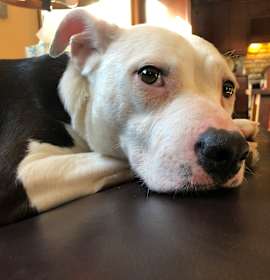
Penny
American Pit Bull Terrier Mutt
Female, adult
Westerville, OH
Not good with dogs
Not good with cats
House-trained
Spayed or Neutered
Shots are up-to-date
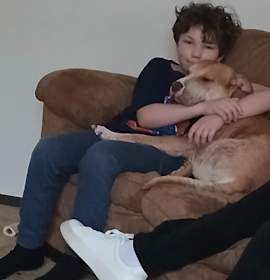
Lucky
Mutt Labrador Retriever
Male, adult
Westerville, OH
Good with dogs
Not good with cats
House-trained

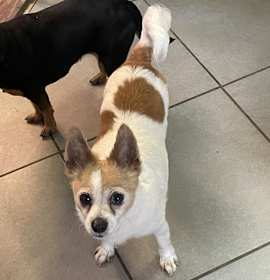
Reddy
Chihuahua Papillon
Male, 9 yrs
Westerville, OH
Not good with dogs
Not good with cats
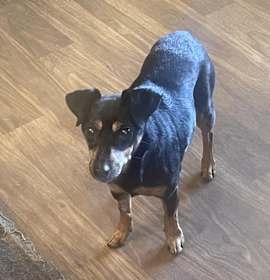
Mini
Miniature Pinscher
Female, 8 yrs
Westerville, OH
Good with dogs
Good with cats
House-trained
Spayed or Neutered
Shots are up-to-date

Barry
Shih Tzu Bichon Frise
Male, 5 yrs 9 mos
Westerville, OH
Not good with dogs
Not good with cats
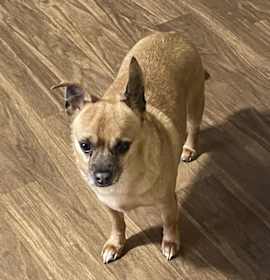
Buddy
Chihuahua
Male, 2 yrs
Westerville, OH
Good with dogs
Not good with cats
Needs experienced adopter
House-trained
Spayed or Neutered
Shots are up-to-date
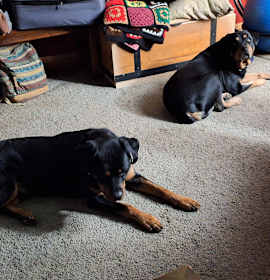
Henry and Raaz
Rottweiler
Male, adult
Westerville, OH
Not good with dogs
Not good with cats
Needs experienced adopter
House-trained
Spayed or Neutered


Lily & Daizy
Chihuahua
Female, 2 yrs
Westerville, OH
Good with dogs
Not good with cats
House-trained
Spayed or Neutered
Shots are up-to-date

Penny
American Pit Bull Terrier Mutt
Female, adult
Westerville, OH
Not good with dogs
Not good with cats
House-trained
Spayed or Neutered
Shots are up-to-date

Lucky
Mutt Labrador Retriever
Male, adult
Westerville, OH
Good with dogs
Not good with cats
House-trained


Reddy
Chihuahua Papillon
Male, 9 yrs
Westerville, OH
Not good with dogs
Not good with cats

Mini
Miniature Pinscher
Female, 8 yrs
Westerville, OH
Good with dogs
Good with cats
House-trained
Spayed or Neutered
Shots are up-to-date

Barry
Shih Tzu Bichon Frise
Male, 5 yrs 9 mos
Westerville, OH
Not good with dogs
Not good with cats

Buddy
Chihuahua
Male, 2 yrs
Westerville, OH
Good with dogs
Not good with cats
Needs experienced adopter
House-trained
Spayed or Neutered
Shots are up-to-date




